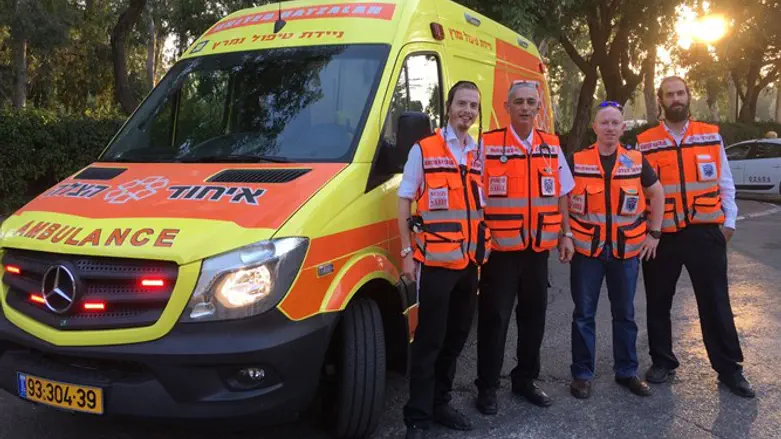
With Passover just around the corner, and pre-Pesach cleaning in full swing, United Hatzalah issued public health and safety tips ahead of the holiday.
Already, volunteers from the organization have responded to dozens of medical emergencies resulting from Pesach cleaning accidents.
First and foremost, United Hatzalah urged, is to keep all cleaning supplies and hot water away from small children during pre-Pesach cleaning.
Burning of the hametz (leaven):
- Hametz should be burned only in the specifically designated containers.
- In areas without specifically designated containers, it is prohibited and dangerous to light a fire in close proximity to thorns, leaves, pine needles, or other brush that is flammable.
- One should encircle the area around any bonfire with stones to limit the fire's ability to expand..
- Do not give children items to throw into the fire.
- Do not throw any spray can or container into the fire.
- Do not leave fires burning without supervision. If you light a fire it is your responsibility to supervise it and eventually put it out before you leave the location.
- Make sure to have at least two large full pails of water near any fire.
- In the event that a person’s clothes catch fire, do not run! Stop. Drop onto the ground and roll on the ground numerous times. One can also cover themselves with a thick blanket or towel.
- In any event of a burn, one should place the affected area under cool running water for 15 minutes and get the area checked by a medical professional.
On the holiday itself:
One of the main dangers on Pesach is that of choking and allergic sensitivities or reactions. It is therefore advised:
- During meals, one should be careful with matza, especially when giving it to small children, and make sure that the pieces are chewed well to avoid choking.
- Be especially careful of fishbones.
- Do not give children under the age of three whole nuts.
With regards to medications:
Bring medications with you if you are visiting or vacationing away from your home over the holiday. It can be very tough to find open pharmacies or lending libraries (gemachs) of medications over the holiday.
Medical Treatment:
In a case of choking or severe allergic reaction, call for emergency services immediately.
Hiking:
- Bring a wide-brimmed hat and at least four liters of water per day for EVERY person on the hike.
- Wear clothing that is appropriate for the intended hiking path. Clothes that keep a person too hot or too cold can be dangerous.
- When hiking, be sure to drink water and not sodas, which do not hydrate a person well.
- Follow trail markers while hiking and do not stray from the outlined path.
- Do not kick or push rocks down hillsides or over cliffs, since you can never know who will be at the bottom.
- Do not enter caves without proper equipment, such as flashlights and reserve batteries.
- Stay out of caves that are marked as being blighted with cave fever. One should check for signs before entering any cave.
- Do not leave trash along the trails and be especially careful of leaving behind anything that is an accelerant or can be flammable. Coals and cigarettes are especially dangerous and need to be disposed of properly.
- Those who are sleeping in tents should make sure not to pitch a tent close to any highways or roadways. In addition, do not pitch tents in areas that are not set aside for camping.
- Do not sleep on or near cliffs or steep hills.
- Make sure at least one contact person who is not traveling with you, knows where your hike will be going and what time you are expected to be home.
- If there is a suspicion of dehydration, poisoning, or in the event of a snake bite or scorpion sting, call for emergency services immediately.
- With regards to snake bites and scorpion stings, DO NOT cut away at the area, attempt to suck out the poison, cool the area, or put on a tourniquet. The best thing to do in such a case is to immobilize the area and the patient and transport them to a hospital as quickly as possible.
The organization added that many older people, including Holocaust survivors, as well as people who suffer from depression or live on their own, find the holidays a particularly difficult time. If you know of any such people it is an act of loving-kindness to invite them to celebrate with you.
Founder and President of United Hatzalah Eli Beer said: “Each year we see that the number of emergency calls received by our organization rises dramatically over the holiday. Many of the calls come from hikers who are not careful, incidents in which the burning of the hametz on Erev Pesach (Passover eve) got out of hand, and children coming into contact with cleaning agents or choking on bits of hametz or matza."
"We are therefore asking the public to be more careful this year than in previous years and be especially aware of these issues, as well as continuing to keep the guidelines relating to the coronavirus, so as to avoid medical emergencies and allow us all to enjoy a safe, healthy, and happy Pesach."
(Photo credit: United Hatzalah)